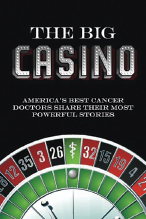
The Big Casino
What’s most impressive is the essentially universal ability of these amazing individuals to continually search for the positive despite distressing news or the development of new symptoms.
In retrospect, I should have written about the 10-Year Club many years ago. The concept is so simple, and the joy and satisfaction I’ve shared with members of my ever-expanding 10-Year Club are so intense.
What Exactly Is the 10-Year Club?
Over the past decades, as a clinician and clinical investigator focused on the care of women with epithelial ovarian cancer, I’ve been privileged to witness the wonders of the human spirit and observe (even if surely too slow in development) profound changes in the outcome of patients diagnosed with this malignancy.

Maurie Markman, MD
One striking observation has been the transformation in the concept of this disease. It has gone from universally acute and rapidly progressive to one that is increasingly associated with prolonged survival and quite satisfactory quality of life (as defined by a patient herself). In fact, the term “serious chronic illness” is increasingly applied to the condition of many women diagnosed with this malignancy. Let me be clear: Epithelial ovarian cancer remains exceedingly complex, insufficiently understood, and all too often a terminal disease.
Surviving Ovarian Cancer
Within this changing paradigm, I’ve had the opportunity to be the primary oncologist, or act as a consultant, for an ever-increasing number of women who have survived for at least 10 years since diagnosis. It is also true that for most, but certainly not all, ovarian cancer patients, this relatively long period has been characterized by remissions and recurrences. Disease management has included one or several surgeries and a variety of antineoplastic therapies, most systemic but some orally administered, delivered with occasional and varying periods of observation without treatment.
The emotions these women have experienced range from elation—when the CA-125 level has decreased into the normal range, all cancer-related symptoms have disappeared or greatly subsided, and surgical exploration reveals no evidence of disease—to understandable distress with symptomatic or asymptomatic (rising CA-125) evidence of disease progression.
Living Life to the Fullest
What’s most impressive is the essentially universal ability of these amazing individuals to continually search for the positive despite distressing news or the development of new symptoms; to quickly move beyond the difficult moment or event; and to use a remarkable inner strength—often with incredible family support—to refocus on their profound desire not only to survive but also to live life to its fullest.
The single most poignant experience for me in my interaction with the growing membership of my 10-Year Club is to ask patients on their 10th anniversary what exactly their original physician (sometimes an oncologist) told them about their prognosis on the day they were first diagnosed. Invariably I hear from the patient (or a family member) something to the effect, “I was told I should get my affairs in order as I had less than a year to live.”
And then they smile. And then I smile. ■
Dr. Markman is President, Medicine and Science at Cancer Treatment Centers of America.

